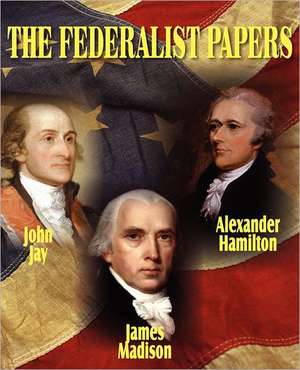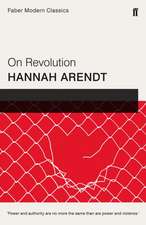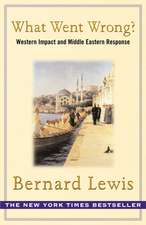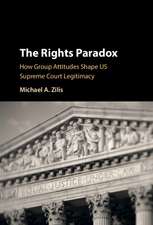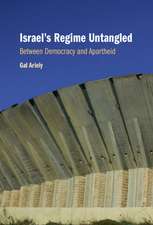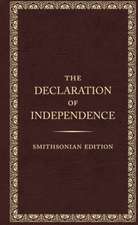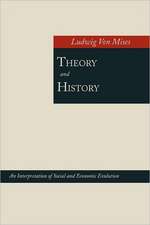The Federalist Papers
Autor Alexander Hamilton, John Jay, James Madisonen Limba Engleză Paperback – 31 iul 2011
Preț: 156.82 lei
Nou
Puncte Express: 235
Preț estimativ în valută:
30.01€ • 31.41$ • 24.98£
30.01€ • 31.41$ • 24.98£
Carte tipărită la comandă
Livrare economică 31 martie-14 aprilie
Preluare comenzi: 021 569.72.76
Specificații
ISBN-13: 9781612032917
ISBN-10: 1612032915
Pagini: 328
Dimensiuni: 191 x 235 x 18 mm
Greutate: 0.57 kg
Editura: Bottom of the Hill Publishing
ISBN-10: 1612032915
Pagini: 328
Dimensiuni: 191 x 235 x 18 mm
Greutate: 0.57 kg
Editura: Bottom of the Hill Publishing
Recenzii de la cititorii Books Express
Razvan Gemanaru a dat nota:
A must read for anyone interested in politics and especially in the federal system of government. A collection of essay by the foremost political thinkers of that time, people like Alexander Hamilton and James Madison, I recommend this book because it's an insightful and at that time groundbreaking work that forms the foundations on which the United States of America was formed.
Notă biografică
James Madison is frequently referred to as "the father of the Constitution" because of the important role that he played in the drafting of the US Constitution during the Constitutional Convention in Philadelphia during the summer of 1787. He also played a key role in drafting the Bill of Rights in the First Federal Congress in 1789. He later served as secretary of state under Thomas Jefferson, and succeeded Jefferson as president, serving two terms in that office and overseeing the United States victory over Great Britain in the War of 1812. He was the last Founding Father to die, in 1836, in Montpelier, Virginia.
Alexander Hamilton was born in the British West Indian island of Nevis sometime between 1755 and 1757. During the American War of Independence, he was captain of a New York artillery company and soon thereafter was promoted to Lieutenant Colonel, serving as George Washington's secretary and aide-de-camp. He was a delegate to the Constitutional Convention of 1787 from New York, Following that Convention, he organized the writing of The Federalist essays, enlisting John Jay and James Madison in the effort. From 1789 to 1795 he served as America’s first secretary of the Treasury. A growing animosity between Hamilton and his longtime New York political rival Aaron Burr culminated in a duel between the two men in 1804. Hamilton was fatally shot and died the day after their encounter
John Jay was a consistent voice for reconciliation with Great Britain in the Continental Congress. While he did not sign the Declaration of Independence, he later worked to secure support for independence in his home state of New York. He was an influential member of the peace delegation that negotiated the treaty of peace with Great Britain ending the Revolutionary War. Recruited by Alexander Hamilton to write essays for The Federalist, his effort was hampered by illness. He later served as the first chief justice of the Supreme Court. He retired from the Supreme Court in 1795 and served as governor of New York for six years before retiring to a farm for the last twenty-seven years of his life.
Richard Beeman, the John Welsh Centennial Professor of History Emeritus at the University of Pennsylvania, has previously served as the Chair of the Department of History, Associate Dean in Penn's School of Arts and Sciences, and Dean of the College of Arts of Sciences. He serves as a trustee of the National Constitution Center and on the center's executive committee. Author of seven previous books, among them The Penguin Guide to the United States Constitution and Plain Honest Men: The Making of the American Constitution, Professor Beeman has received numerous grants and awards including fellowships from the National Endowment for the Humanities, the Rockefeller Foundation, the Institute for Advanced Study at Princeton, and the Huntington Library. His biography of Patrick Henry was a finalist for the National Book Award.
Alexander Hamilton was born in the British West Indian island of Nevis sometime between 1755 and 1757. During the American War of Independence, he was captain of a New York artillery company and soon thereafter was promoted to Lieutenant Colonel, serving as George Washington's secretary and aide-de-camp. He was a delegate to the Constitutional Convention of 1787 from New York, Following that Convention, he organized the writing of The Federalist essays, enlisting John Jay and James Madison in the effort. From 1789 to 1795 he served as America’s first secretary of the Treasury. A growing animosity between Hamilton and his longtime New York political rival Aaron Burr culminated in a duel between the two men in 1804. Hamilton was fatally shot and died the day after their encounter
John Jay was a consistent voice for reconciliation with Great Britain in the Continental Congress. While he did not sign the Declaration of Independence, he later worked to secure support for independence in his home state of New York. He was an influential member of the peace delegation that negotiated the treaty of peace with Great Britain ending the Revolutionary War. Recruited by Alexander Hamilton to write essays for The Federalist, his effort was hampered by illness. He later served as the first chief justice of the Supreme Court. He retired from the Supreme Court in 1795 and served as governor of New York for six years before retiring to a farm for the last twenty-seven years of his life.
Richard Beeman, the John Welsh Centennial Professor of History Emeritus at the University of Pennsylvania, has previously served as the Chair of the Department of History, Associate Dean in Penn's School of Arts and Sciences, and Dean of the College of Arts of Sciences. He serves as a trustee of the National Constitution Center and on the center's executive committee. Author of seven previous books, among them The Penguin Guide to the United States Constitution and Plain Honest Men: The Making of the American Constitution, Professor Beeman has received numerous grants and awards including fellowships from the National Endowment for the Humanities, the Rockefeller Foundation, the Institute for Advanced Study at Princeton, and the Huntington Library. His biography of Patrick Henry was a finalist for the National Book Award.
Descriere
Descriere de la o altă ediție sau format:
Written at a time when furious arguments are raging about the best way to govern America, this title aims of persuading New Yorkers to accept the newly drafted Constitution in 1787. It makes a case for power-sharing between State and Federal authorities and for a Constitution that has endured largely unchanged for two hundred years.
Written at a time when furious arguments are raging about the best way to govern America, this title aims of persuading New Yorkers to accept the newly drafted Constitution in 1787. It makes a case for power-sharing between State and Federal authorities and for a Constitution that has endured largely unchanged for two hundred years.
Extras
The Federalist No. 1: Hamilton
October 27, 1787
To the People of the State of New York.
After an unequivocal experience of the inefficacy of the subsisting Federal Government, you are called upon to deliberate on a new Constitution for the United States of America. The subject speaks its own importance; comprehending in its consequences, nothing less than the existence of the Union, the safety and welfare of the parts of which it is composed, the fate of an empire, in many respects, the most interesting in the world. It has been frequently remarked, that it seems to have been reserved to the people of this country, by their conduct and example, to decide the important question, whether societies of men are really capable or not, of establishing good government from reflection and choice, or whether they are forever destined to depend, for their political constitutions, on accident and force. If there be any truth in the remark, the crisis, at which we are arrived, may with propriety be regarded as the æra in which that decision is to be made; and a wrong election of the part we shall act, may, in this view, deserve to be considered as the general misfortune of mankind.
This idea will add the inducements of philanthropy to those of patriotism to heighten the solicitude, which all considerate and good men must feel for the event. Happy will it be if our choice should be directed by a judicious estimate of our true interests, unperplexed and unbiassed by considerations not connected with the public good. But this is a thing more ardently to be wished than seriously to be expected. The plan offered to our deliberations, affects too many particular interests, innovates upon too many local institutions, not to involve in its discussion a variety of objects foreign to its merits, and of views, passions and prejudices little favourable to the discovery of truth.
Among the most formidable of the obstacles which the new Constitution will have to encounter, may readily be distinguished the obvious interest of a certain class of men in every State to resist all changes which may hazard a diminution of the power, emolument and consequence of the offices they hold under the State-establishments-and the perverted ambition of another class of men, who will either hope to aggrandise themselves by the confusions of their country, or will flatter themselves with fairer prospects of elevation from the subdivision of the empire into several partial confederacies, than from its union under one government.
It is not, however, my design to dwell upon observations of this nature. I am well aware that it would be disingenuous to resolve indiscriminately the opposition of any set of men (merely because their situations might subject them to suspicion) into interested or ambitious views: Candour will oblige us to admit, that even such men may be actuated by upright intentions; and it cannot be doubted that much of the opposition which has made its appearance, or may hereafter make its appearance, will spring from sources, blameless at least, if not respectable, the honest errors of minds led astray by preconceived jealousies and fears. So numerous indeed and so powerful are the causes, which serve to give a false bias to the judgment, that we upon many occasions, see wise and good men on the wrong as well as on the right side of questions, of the first magnitude to society. This circumstance, if duly attended to, would furnish a lesson of moderation to those, who are ever so much persuaded of their being in the right, in any controversy. And a further reason for caution, in this respect, might be drawn from the reflection, that we are not always sure, that those who advocate the truth are influenced by purer principles than their antagonists. Ambition, avarice, personal animosity, party opposition, and many other motives, not more laudable than these, are apt to operate as well upon those who support as upon those who oppose the right side of a question. Were there not even these inducements to moderation, nothing could be more illjudged than that intolerant spirit, which has, at all times, characterised political parties. For, in politics as in religion, it is equally absurd to aim at making proselytes by fire and sword. Heresies in either can rarely be cured by persecution.
And yet however just these sentiments will be allowed to be, we have already sufficient indications, that it will happen in this as in all former cases of great national discussion. A torrent of angry and malignant passions will be let loose. To judge from the conduct of the opposite parties, we shall be led to conclude, that they will mutually hope to evince the justness of their opinions, and to increase the number of their converts by the loudness of their declamations, and by the bitterness of their invectives. An enlightened zeal for the energy and efficiency of government will be stigmatized, as the off-spring of a temper fond of despotic power and hostile to the principles of liberty. An overscrupulous jealousy of danger to the rights of the people, which is more commonly the fault of the head than of the heart, will be represented as mere pretence and artifice; the bait for popularity at the expence of public good. It will be forgotten, on the one hand, that jealousy is the usual concomitant of violent love, and that the noble enthusiasm of liberty is too apt to be infected with a spirit of narrow and illiberal distrust. On the other hand, it will be equally forgotten, that the vigour of government is essential to the security of liberty; that, in the contemplation of a sound and well informed judgment, their interest can never be separated; and that a dangerous ambition more often lurks behind the specious mask of zeal for the rights of the people, than under the forbidding appearance of zeal for the firmness and efficiency of government. History will teach us, that the former has been found a much more certain road to the introduction of despotism, than the latter, and that of those men who have overturned the liberties of republics the greatest number have begun their career, by paying an obsequious court to the people, commencing Demagogues and ending Tyrants.
In the course of the preceeding observations I have had an eye, my Fellow Citizens, to putting you upon your guard against all attempts, from whatever quarter, to influence your decision in a matter of the utmost moment to your welfare by any impressions other than those which may result from the evidence of truth. You will, no doubt, at the same time, have collected from the general scope of them that they proceed from a source not unfriendly to the new Constitution. Yes, my Countrymen, I own to you, that, after having given it an attentive consideration, I am clearly of opinion, it is your interest to adopt it. I am convinced, that this is the safest course for your liberty, your dignity, and your happiness. I effect not reserves, which I do not feel. I will not amuse you with an appearance of deliberation, when I have decided. I frankly acknowledge to you my convictions, and I will freely lay before you the reasons on which they are founded. The consciousness of good intentions disdains ambiguity. I shall not however multiply professions on this head. My motives must remain in the depository of my own breast: My arguments will be open to all, and may be judged of by all. They shall at least be offered in a spirit, which will not disgrace the cause of truth.
I propose in a series of papers to discuss the following interesting particulars-The utility of the Union to your political prosperity-The insufficiency of the present Confederation to preserve that Union-The necessity of a government at least equally energetic with the one proposed to the attainment of this object-The conformity of the proposed constitution to the true principles of republican government-Its analogy to your own state constitution-and lastly, The additional security, which its adoption will afford to the preservation of that species of government, to liberty and to property.
In the progress of this discussion I shall endeavour to give a satisfactory answer to all the objections which shall have made their appearance that may seem to have any claim to your attention.
It may perhaps be thought superfluous to offer arguments to prove the utility of the Union, a point, no doubt, deeply engraved on the hearts of the great body of the people in every state, and one, which it may be imagined has no adversaries. But the fact is, that we already hear it whispered in the private circles of those who oppose the new constitution, that the Thirteen States are of too great extent for any general system, and that we must of necessity resort to separate confederacies of distinct portions of the whole.1 This doctrine will, in all probability, be gradually propagated, till it has votaries enough to countenance an open avowal of it. For nothing can be more evident, to those who are able to take an enlarged view of the subject, than the alternative of an adoption of the new Constitution, or a dismemberment of the Union. It will therefore be of use to begin by examining the advantages of that Union, the certain evils and the probable dangers, to which every State will be exposed from its dissolution. This shall accordingly constitute the subject of my next address.
October 27, 1787
To the People of the State of New York.
After an unequivocal experience of the inefficacy of the subsisting Federal Government, you are called upon to deliberate on a new Constitution for the United States of America. The subject speaks its own importance; comprehending in its consequences, nothing less than the existence of the Union, the safety and welfare of the parts of which it is composed, the fate of an empire, in many respects, the most interesting in the world. It has been frequently remarked, that it seems to have been reserved to the people of this country, by their conduct and example, to decide the important question, whether societies of men are really capable or not, of establishing good government from reflection and choice, or whether they are forever destined to depend, for their political constitutions, on accident and force. If there be any truth in the remark, the crisis, at which we are arrived, may with propriety be regarded as the æra in which that decision is to be made; and a wrong election of the part we shall act, may, in this view, deserve to be considered as the general misfortune of mankind.
This idea will add the inducements of philanthropy to those of patriotism to heighten the solicitude, which all considerate and good men must feel for the event. Happy will it be if our choice should be directed by a judicious estimate of our true interests, unperplexed and unbiassed by considerations not connected with the public good. But this is a thing more ardently to be wished than seriously to be expected. The plan offered to our deliberations, affects too many particular interests, innovates upon too many local institutions, not to involve in its discussion a variety of objects foreign to its merits, and of views, passions and prejudices little favourable to the discovery of truth.
Among the most formidable of the obstacles which the new Constitution will have to encounter, may readily be distinguished the obvious interest of a certain class of men in every State to resist all changes which may hazard a diminution of the power, emolument and consequence of the offices they hold under the State-establishments-and the perverted ambition of another class of men, who will either hope to aggrandise themselves by the confusions of their country, or will flatter themselves with fairer prospects of elevation from the subdivision of the empire into several partial confederacies, than from its union under one government.
It is not, however, my design to dwell upon observations of this nature. I am well aware that it would be disingenuous to resolve indiscriminately the opposition of any set of men (merely because their situations might subject them to suspicion) into interested or ambitious views: Candour will oblige us to admit, that even such men may be actuated by upright intentions; and it cannot be doubted that much of the opposition which has made its appearance, or may hereafter make its appearance, will spring from sources, blameless at least, if not respectable, the honest errors of minds led astray by preconceived jealousies and fears. So numerous indeed and so powerful are the causes, which serve to give a false bias to the judgment, that we upon many occasions, see wise and good men on the wrong as well as on the right side of questions, of the first magnitude to society. This circumstance, if duly attended to, would furnish a lesson of moderation to those, who are ever so much persuaded of their being in the right, in any controversy. And a further reason for caution, in this respect, might be drawn from the reflection, that we are not always sure, that those who advocate the truth are influenced by purer principles than their antagonists. Ambition, avarice, personal animosity, party opposition, and many other motives, not more laudable than these, are apt to operate as well upon those who support as upon those who oppose the right side of a question. Were there not even these inducements to moderation, nothing could be more illjudged than that intolerant spirit, which has, at all times, characterised political parties. For, in politics as in religion, it is equally absurd to aim at making proselytes by fire and sword. Heresies in either can rarely be cured by persecution.
And yet however just these sentiments will be allowed to be, we have already sufficient indications, that it will happen in this as in all former cases of great national discussion. A torrent of angry and malignant passions will be let loose. To judge from the conduct of the opposite parties, we shall be led to conclude, that they will mutually hope to evince the justness of their opinions, and to increase the number of their converts by the loudness of their declamations, and by the bitterness of their invectives. An enlightened zeal for the energy and efficiency of government will be stigmatized, as the off-spring of a temper fond of despotic power and hostile to the principles of liberty. An overscrupulous jealousy of danger to the rights of the people, which is more commonly the fault of the head than of the heart, will be represented as mere pretence and artifice; the bait for popularity at the expence of public good. It will be forgotten, on the one hand, that jealousy is the usual concomitant of violent love, and that the noble enthusiasm of liberty is too apt to be infected with a spirit of narrow and illiberal distrust. On the other hand, it will be equally forgotten, that the vigour of government is essential to the security of liberty; that, in the contemplation of a sound and well informed judgment, their interest can never be separated; and that a dangerous ambition more often lurks behind the specious mask of zeal for the rights of the people, than under the forbidding appearance of zeal for the firmness and efficiency of government. History will teach us, that the former has been found a much more certain road to the introduction of despotism, than the latter, and that of those men who have overturned the liberties of republics the greatest number have begun their career, by paying an obsequious court to the people, commencing Demagogues and ending Tyrants.
In the course of the preceeding observations I have had an eye, my Fellow Citizens, to putting you upon your guard against all attempts, from whatever quarter, to influence your decision in a matter of the utmost moment to your welfare by any impressions other than those which may result from the evidence of truth. You will, no doubt, at the same time, have collected from the general scope of them that they proceed from a source not unfriendly to the new Constitution. Yes, my Countrymen, I own to you, that, after having given it an attentive consideration, I am clearly of opinion, it is your interest to adopt it. I am convinced, that this is the safest course for your liberty, your dignity, and your happiness. I effect not reserves, which I do not feel. I will not amuse you with an appearance of deliberation, when I have decided. I frankly acknowledge to you my convictions, and I will freely lay before you the reasons on which they are founded. The consciousness of good intentions disdains ambiguity. I shall not however multiply professions on this head. My motives must remain in the depository of my own breast: My arguments will be open to all, and may be judged of by all. They shall at least be offered in a spirit, which will not disgrace the cause of truth.
I propose in a series of papers to discuss the following interesting particulars-The utility of the Union to your political prosperity-The insufficiency of the present Confederation to preserve that Union-The necessity of a government at least equally energetic with the one proposed to the attainment of this object-The conformity of the proposed constitution to the true principles of republican government-Its analogy to your own state constitution-and lastly, The additional security, which its adoption will afford to the preservation of that species of government, to liberty and to property.
In the progress of this discussion I shall endeavour to give a satisfactory answer to all the objections which shall have made their appearance that may seem to have any claim to your attention.
It may perhaps be thought superfluous to offer arguments to prove the utility of the Union, a point, no doubt, deeply engraved on the hearts of the great body of the people in every state, and one, which it may be imagined has no adversaries. But the fact is, that we already hear it whispered in the private circles of those who oppose the new constitution, that the Thirteen States are of too great extent for any general system, and that we must of necessity resort to separate confederacies of distinct portions of the whole.1 This doctrine will, in all probability, be gradually propagated, till it has votaries enough to countenance an open avowal of it. For nothing can be more evident, to those who are able to take an enlarged view of the subject, than the alternative of an adoption of the new Constitution, or a dismemberment of the Union. It will therefore be of use to begin by examining the advantages of that Union, the certain evils and the probable dangers, to which every State will be exposed from its dissolution. This shall accordingly constitute the subject of my next address.
